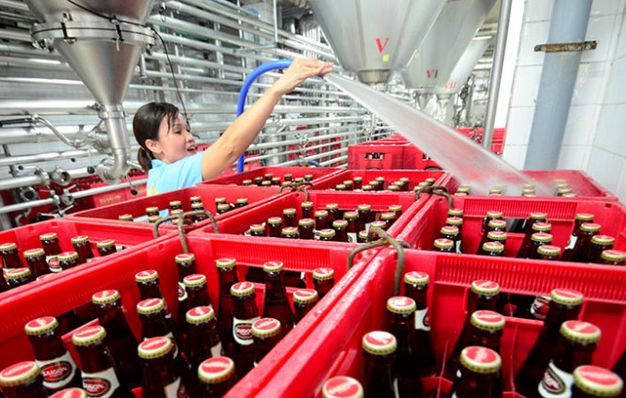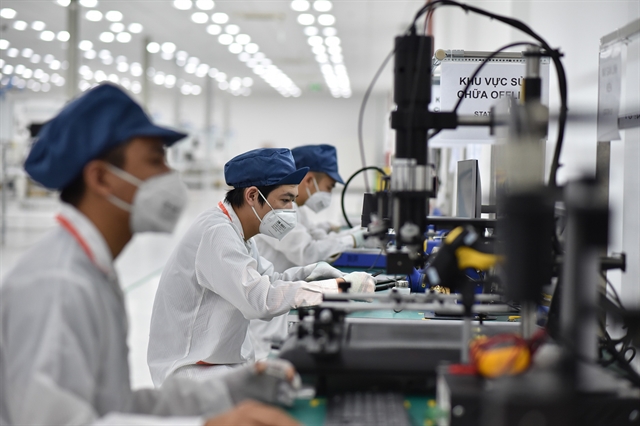The Indonesian regulations seemed straightforward until we dug deeper. A Fortune Global 500 client was planning their market entry strategies, confident they had ticked all the regulatory compliance boxes. However, the reality on the ground was far more complex. The official pharma regulation stated one thing, but the unwritten rules of implementation at the National […]
State-owned enterprises (SOEs) equitization has gained increasing popularity among investors recently. Particularly, SOEs held a large resource of the economy, about 7% of the total assets and 10% of the equity of all enterprises in the market. This accounted for about 25.78% of the total production and business capital, 23.4% of the value of fixed assets and long-term financial investments of operating enterprises.
In fact, in Vietnam's business and investment environment, foreign investors tend to invest in enterprises of their interested industries and in alignment with their investment strategies and the ratio of state capital holding in enterprises post-divestment.
The resonance of benefits between foreign investors and equitized State-owned Enterprises (SOEs)
In many cases, after purchasing shares in State-owned Enterprises (SOEs), foreign investors have significantly improved business performance. This can be explained by the contribution of foreign investors in modernizing business governance and providing a rich source of international information. As a result, the participation of foreign investment in SOEs helps make information transparent and enhance the growth strategy of the enterprises.
Additionally, in the case of engaging in the management apparatus of enterprises, foreign investors can make technological improvements and help enterprises improve competitiveness, thereby expanding markets and increasing economies of scale. The recent evidence shows that opportunities are promising to invest in equitized state-owned companies in key and developed economic sectors.
Hit deals in State-owned enterprises equitization
In the period 2016-2020, the M&A market recorded three deals in state-owned equitization divestment which are Vietnam Dairy Products Joint Stock Company (Vinamilk), Binh Minh Plastic Joint Stock Company and Saigon Beer - Alcohol - Beverage Corporation - SABECO.

According to Mr. Le Song Lai - Deputy General Director of State Capital Investment and Trading Corporation (SCIC), in the divestment of Vinamilk, SCIC collected more than 8 million USD, 16 times much higher than the cost prices. Meanwhile, the divestment of Binh Minh Plastic Joint Stock generated more than 9 thousand USD for SCIC, 9.6 times higher than the cost prices. Thus, the capital sales of SCIC has made quite an impression on investors, regarding state-owned capital transfer.
After 15 years in operation, SCIC has divested successfully 1,017 enterprises. Especially, in the period of 2016-2020, foreign investors participated in buying SCIC's capital in various divestment deals with a total value of nearly 10 billion USD, 15 times higher than the book value. Notably, thanks to the participation of foreign investors, the divestment process of large enterprises has brought better results.
As one of the first enterprises to sell capital to foreign investors, a representative of Post and Telecommunications Insurance Joint Stock Company (PTI) shared
“In 2015, PTI issued a capital increase for foreign strategic shareholders. After having a foreign strategic shareholder, the revenue, profit, financial capacity, and scale of the enterprise increased rapidly, market share was expanded, and corporate governance was improved. By 2020, the revenue of this enterprise has quadrupled compared to before the capital sale and ranked third in market size”
List of divestment companies
Based on Decision No. 64/QD-DTKDV dated 31/3/2021, SCIC issued a list of enterprises implementing capital sales in 2021. Among the enterprises on capital sales in 2021, Bao Viet Investment Joint Stock Company, Bao Minh Joint Stock Corporation, Binh Minh Plastic Joint Stock Company are of the top interest to investors. You can see the list here!
Privatization process

The process of SOE reform in Vietnam experienced three main stages: the period of 1980−1986, the period of 1986−2001, and from 2001 to present. Prior to the Doi Moi period (1980 - 1986), SOEs and other forms of business underwent fundamental changes to shift the Vietnamese economy from a central to a socialist-oriented market economy. If an SOE passes through valuation for its book value, it will start with one of three options for restructuring ownership including private sale for investors, IPO or wholesale for strategic investors.
Enterprises valuation is a fundamental part of the privatization process when facilitating price negotiation between the government and strategic investors. It is also a bottleneck in the whole process, yet it can prevent a large number of SOEs from successful equitization. If the enterprise's valuation process has not been conducted with a robust monitoring system, state assets would suffer a value loss. As a result, this can cause a pressing impediment toward effective SOEs equitization.
Risks in purchasing shares of SOEs
Deposit
Mr. Le Song Lai assessed that the main challenges for foreign investors in shares purchase of SOEs lies in the deposit regulations. In particular, investors have to deposit a large amount of money to register buying shares while not knowing whether to buy it or not. This creates a sense of apprehension among investors on deciding to join the offering.
Further, to make a deposit, investors must convert from foreign currency to VND. Yet, in case the investors do not win the deals, they must convert back the currencies, creating a risk of exchange rate difference and increasing international money transfer cost. Especially, for transactions worth trillions of VND, a short transaction time will affect the domestic money market when the need for local currency suddenly surges to exchange for an extremely large amount of foreign currency.
The rate of capital ownership
Besides the risk in deposit, foreign investors face the restrictions in the capital ownership rate when purchasing shares in capitalized SOEs. In fact, several industries do not have specific legal provisions on this issue. Therefore, some enterprises in those industries have sent official letters to consult the ministries and other functional agencies, yet they have received no response.
In this way, foreign investors do not know if they are permitted to participate in the capital sale or not. As the plan of the government specified in capitalizing SOEs, enterprises will continue to reduce the state ownership ratio to 65%. However, despite 35% belonging to foreign investors, the rooms for them to jump in are full.
Information disclosure and Asset Appraisal

The current methods for asset appraisal are quite complicated, causing several shortcomings. In accordance with regulations, enterprises can apply two methods to evaluate the value when equitization, either discounted cash flow (DCF) or asset-based valuation.
The DCF method is based on the earnings from future production and business activities of the enterprise. In application of this method, businesses must determine the indispensable information, namely profit margin of 3-5 consecutive years and in expected 5-10 years, growth rate, risk coefficient, among others.
However, according to Mr. Tran Viet Duc - consulting director of Vietnam Auditing Company, determination of the aforementioned information is quite challenging and demands a long time. As a consequence, this method has not been widely adopted in practice.
The complexity of the first method has made businesses choose to calculate by asset value. But the biggest shortcoming of the alternative method is not accurately calculating the business advantage. Specifically, asset-based valuation is measured by the actual value of all assets at market prices and business advantages, in which Business advantage = State capital according to accounting books at the time of valuation x (profit margin after tax over State capital on average in the 3 years before equitization - Government bond interest rate for the last 10 years).
Yet, Mr. Duc evaluated that the calculation based only on these indicators will not ensure the accuracy. Particularly, the ratio of profit after tax on state capital is affected by various factors namely production costs, management level and even policies, while the business advantages are only one factor consisting of the profit of an enterprise. For example, the profit margin may increase dramatically in the last 1-2 years due to special conditions or inaccurate declaration. So, it will immediately affect the calculation results.
SOEs’ contracting authority
The management and use of state-owned assets is subject to diverse regulations. In detail, the general regulation of the Law on Enterprises and the Law on Securities, and the specific administrative regulations have significant effects on the state-owned assets use and management.
For instance, the decision-making authority for investment projects or the purchase and sale of fixed assets within 50% of equity belongs to the Board of Members or the President of that enterprise. For projects and assets with value more than 50%, the owner’s representing agencies shall have the reviewing and approving authority
Article 24 of the Law on Management and Utilization of State owned capital for Investment in production and business in Enterprise(s)

As subject to various legal regulations, SOEs must be exposed to a higher legal compliance level than non-state owned enterprise(s). In fact, parties often feel more reassured in cooperation with SOEs because they mistakenly believe SOEs as state representing agencies, or because of “soft power” in SOEs. These misconceptions lead to the cursory research and review stages of partners. Thus, this can result in unexpected risks afterwards.
The operation issue after buying shares
As mentioned earlier, SOE equitization can modernize business governance. Yet, this can cause human resource risk! Moving to equitization entails a change in management apparatus of the enterprise. Therefore, the change in business management is of concern to businesses as they do not certainly know the management strategy and the use of personnel in the new apparatus.
As a result, there is a slight change of internal conflict among stakeholders. However, if the investment strategy is suitable and long-term, it will create favorable conditions for the whole organization to thrive.
Conclusion
Though challenges remain, opportunities are wide open for foreign investors in capitalized SOEs. But, how can you leverage these chances and reap the benefits of what you sow? It is wise to have a leading expert by your side and guide you through the legal process of setting up a business here. With over 10-year experience in diverse industries, Viettonkin is confident to deliver updated market and legislation information. Having us with you, you are supported by a team of top-notch experts along your journey in Vietnam. Contact us now for your best results!












